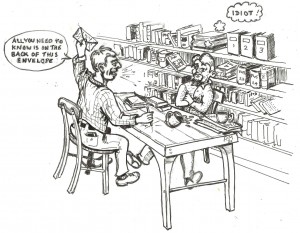BENFORD’S LAW (2)
In my previous post (Benford’s Law – 1), I footnoted the following:
“Confusingly, there is another Benford’s Law, propounded in 1980 by US physicist Gregory Benford. It states: “Passion is inversely proportional to the amount of real information available”. (Gregory) Benford’s “Law” is an interesting and humorous aphorism rather than a scientific Law and is much less known than that of Simon Newcomb and Frank Benford.”
Gregory Benson’s Law. Click for larger image
The “Law” comes from the words of a character in Gregory Benford’s 1980 Sci-Fi novel “Timescape”. According to the Wiki synopsis, Timescape is a dystopian novel set in a future 1998 where the world is threatened by human-caused ecological disaster. It is saved by a hero scientist (a physicist, of course) who invents a time machine and travels back to the 1980s in order to persuade humanity from their evil ways, but in the process gets involved in various time related paradoxes. The novel was popular and won many awards. Sounds like a fun read.
The first of the three blockbuster films in the movie franchise series Back to the Future, was released only two years later. Their creator and Director – Robert Zemickis – could easily have been inspired by Gregory Benford’s book. The films feature a genius scientist (Emmet “Doc” Brown), who is most definitely passionate, so any influence from Gregory Benford’s book was maybe not too deep.
However, the idea behind Gregory Benford’s “Law” is hardly original. In the 5th century BC, Greek historian Thucydides wrote: “Ignorance is bold and knowledge is reserved”. In his 1928 book Skeptical Essays, British philosopher and mathematician Betrand Russell wrote: “Passion is the measure of the holders’ lack of knowledge”. Both these authors put the idea much more succinctly than Gregory Benford.
We can all nod and smile at this, thinking perhaps of passionate youth confronting their elders with their new-found insights. The elders just smile calmly with the close-lipped smile of reason and knowledge. Greta Thunberg immediately springs to mind.
The “smile” of youthful passion (and ignorance) – 16-year-old Greta Thunberg addresses the United Nations on Climate Change, 23rd September 2019.
The close-lipped smile of reason and knowledge (with a touch of hubris) – 45-year-old Sky News host Rita Panahi, posing.
But of course, passion is a psychological trait that does not necessarily accompany youth or age, ignorance or knowledge. Youthful passion can sometimes reflect real insight denied the more orthodox thinking of their elders, and there is no reason why someone with deep knowledge should not be passionate in arguing for their subject. Aphorisms can only go so far.


